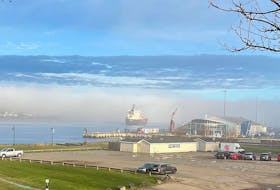Outside In is a five-part series that delves into the global issues affecting business in 2019.

It is volatile times in the energy business and Todd McDonald says his business is helping clients manage their energy requirements during changing circumstances, so business is good.
McDonald is founder and CEO of Energy Atlantica, an energy trading company based in Halifax and focused on the unique energy needs of clients in Atlantic Canada and the northeastern United States.
“I think the biggest change (so far in 2019) is the end of Sable (Offshore Energy Project) and Deep Panuke actually happened. They’re no longer things that will happen in the future and now 100 per cent of our natural gas is imported from other regions,” he says.
“It used to be we had all (the natural gas) to meet our needs and we had tons left over, and we would send it away and we would sell it and some of the profits would be shared among Atlantic Canadians,” McDonald says. “So, we’ve slowly went from that, to not having much and having to import most of it, and now we have to import all of it.”
Now, all the natural gas in the region is coming from fracked wells in either the Marcellus region of the United States or Alberta. “Those would be your two primary sources, there’s a lot coming from Alberta and there’s a lot coming from Marcellus,” he says.
Enbridge is bringing in some natural gas, as is Heritage Gas and many of the industrial clients, generators, are bringing some in, and that encompasses everybody doing the gas importing, says McDonald.
Much riding on Muskrat Falls

Meanwhile, the ill-fated Muskrat Falls hydroelectric project has been devastating to Newfoundland and Labrador.
McDonald says he believes Muskrat Falls electricity will not be coming on stream until mid-2020.
“Newfoundland ... they’re in a lot of trouble and I would bet anybody a dollar, or as much as they want, that they will have a federal bailout. That province is bankrupt based on Muskrat Falls,” he says.
“What they’ll effectively need is to renegotiate with the feds on royalty sharing (from offshore oil production) and that’s probably how they’ll dig themselves out of the hole but if you think about it, that is just another federal taxpayer subsidy. The rest of the country is going to have to bail out Newfoundland because of Muskrat Falls, there are no if, ands or buts about that,” he says.
“And certainly the private-equity and bond market would substantiate that (view) because Newfoundland ... can’t even borrow money in the private sector any more.”
McDonald says he wouldn’t be surprised if Newfoundland and Labrador would want to renegotiate its energy deal with Nova Scotia as well, but that arrangement is “fairly ironclad.”
“I wouldn’t be surprised if somebody tried to get some money out of us but I don’t think Nova Scotia is at risk,” he says.
Should Atlantic Canada explore its resource wealth
Muskrat Falls aside, McDonald says he would love to have an honest argument about whether we (the Atlantic region) should develop its natural resources.
“New Brunswick has made a change recently, the government there has said that it will allow for the fracking of natural gas. Nova Scotia maintains a ban on it,” he says. “If I was king for a day, for all the region, you would develop your natural gas and you would create jobs and royalties and the ability for cheap electricity. And it’s better than oil.”
“We (Nova Scotia) as a province still produce 54 per cent (of its electricity) using coal and another 10 per cent or so using oil. So, still almost two-thirds of our electricity is created using coal or oil,” says McDonald. “Those numbers are going down a little bit but it’s still over half.”
“But we can’t take any more wind (on the power grid), we do need alternative methods of generating power to prevent the lights from going out,” he says.
“Natural gas is cleaner than coal and oil and it can be a nice transitional fuel until we can get higher levels of wind and solar at affordable prices,” says McDonald.
What does the future hold for energy in Atlantic Canadian?
Click the photos or headlines to here what those in the field have to say.

VIDEO: ‘There is opportunity on the horizon,’ says N.L.-based energy entrepreneur

Wind key in Nova Scotia’s push to renewable energy









